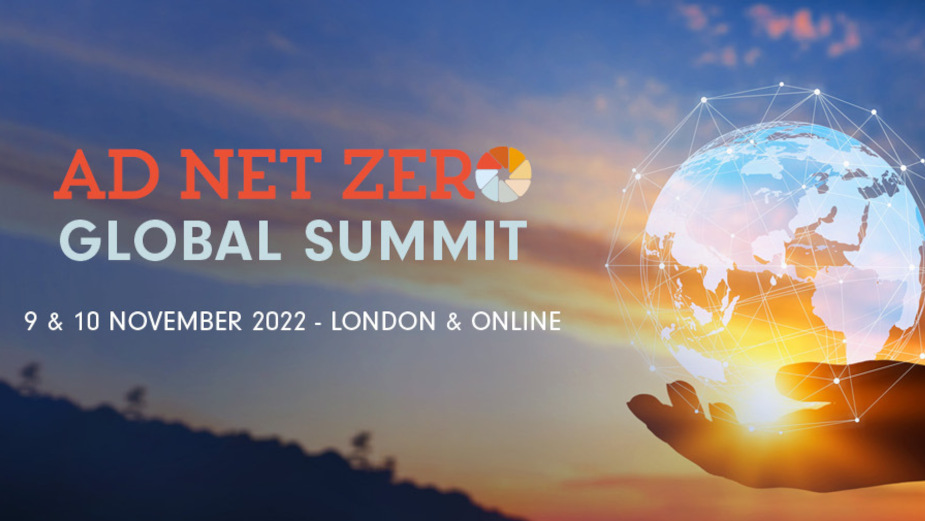
Ad Net Zero Global Summit 2022: The Highlights from Today

Today was the first day of the global summit held by Ad Net Zero, the industry’s initiative to decarbonise ad operations and harness advertising’s power to drive sustainable behaviour change. Held in Park Village in London over the 9th and 10th of November, the summit has drawn experts from across the field and the world, that together aim to not only embed sustainability into their respective categories, but put it on top of the agenda.
The first day of the summit started off with a session on ‘Advertising Environmental Claims Correctly’, chaired by Seb Munden, chair at Ad Net Zero. Herein, the panellists took a closer look at the rules and guidance available to promote sustainable products and services in a correct and responsible way. Overall, talks before noon concentrated on making businesses more sustainable, and drew on insights from experts and companies that are leading their way, such as Coffee & TV, ITV, and others.
In the afternoon, John Osborn, USA director of Ad Net Zero and Josh Lockwood, vice president at the American Red Cross climate crisis campaign, came together to discuss the climate crisis in the United States, and why the challenges it poses become more and more unavoidable by the day.
John, who had joined the board of directors of the American Red Cross in 2012 - the year that superstorm Sandy left its permanent mark on the United States - started with the strong message of urgency: “We simply cannot miss our chance to make things better for the coming generations,” he said. “I want to paint a true picture of the scene here in the United States.” Reflecting on the worry that those types of climate disasters have increased in number and severity, John added that this issue could wait no longer.
Josh spoke more on the real and metaphorical storms that the US is facing today from the perspective of the Red Cross, which remains relevant through the relentless help of BBDO in its campaigning. “In the history of the Red Cross, there have been a few moments where we have needed to adapt our mission,” said Josh. “The challenge posed by the warming climate today is one of those moments. We are facing a generational crisis. In the ’80s, on average, there were 2.9 disasters per year. Over the past 10 years, this number has increased to 20 per year. This means that our work also has increased by the same amount.”
Josh added that the severity of the situation affects a quarter of the American population more so than the rest, as they are the portion that does not have emergency savings - representing the populus that need the Red Cross the most. He continued,saying that the organisation is gearing up for the coming years, and has already been investing time and resources in making sure they help those most vulnerable in a period where natural disasters can strike without any warning. “We have new strategies, more volunteers and more innovations that help us reach the people that need us quicker. We are hiring workers and volunteers that are representing and understanding those groups, more so than before, and we are also providing bridge financial assistance for those groups of people that need help beyond the moment disaster strikes.”
The Red Cross is also investing into prevention, helping families with disaster drills, teaching them how to make smart decisions with their surroundings, and ensuring they’re aware of the risks of their areas and living situations. Concluding this segment, John said that there truly is no time like now. “Study after study shows that people want to join organisations that have a positive impact,” he said. “Other studies show that people want to buy from brands that do the same. So, no time like now - speak up! Let your voice be known! Ask companies about their efforts!”
In an almost direct answer to that, Mark Whelan, chairman and CCO of Havas UK, came on stage to discuss what kind of company Havas wants to be, and from that - what kind of companies all other companies want to be in this crucial moment in history. In a special keynote, Mark spoke about Havas’ efforts in recent years, their hopes for the future, and how the industry can help itself internally to reach these paramount goals that it has set for itself, and keep itself accountable.
Next, advertising leaders came together to address the challenge of how to put brands and their advertising partners on a more sustainable path around the world. Angie Gifford, VP EMEA at Meta, Karen Sauder, president, global clients and agency solutions at Google, Sergio Lopez, global head of production at Publicis Groupe, Aisling Ryan, managing partner sustainability at Ogilvy Consulting, and Stephen Woodford, chief executive of the Advertising Association all delved into the subject.
When speaking of compelling reasons to put sustainability on top of the agenda, Angie commented: “When you think about the business response to climate change, we have a reason to be optimistic. When you look at business teams today, they are all taking sustainability into account and working hard to achieve their goals. Just a few years ago that was not the case.”
According to Karen, for Google, sustainability has already been on top of the agenda for some time now. “There is no time to waste,” she said on behalf of the brand. “What is good for the planet is good for business today. The question isn’t why leadership should put this on their agenda, but how. Joining Ad Net Zero and these conversations is one way to start.”
Showing impact and not only strategy on paper is the goal for all companies on their sustainability journey, but Aisling explained that what that might look like also heavily depends on where they are on that journey. “Sometimes it can be about elevating your strategy and incorporating a broader sustainability vision to take forward, and sometimes it can be about how to create a win for all stakeholders with your sustainability plan,” she said. “Sustainability should be a growth mindset, not a short term practice. You should never succumb to short-term pressures because everybody will remember that, and it is hugely important to build credibility and be able to show progress.”
According to Sergio, although the industry’s efforts should never come to a halt, based on the impact he has seen (especially in his sector over the past five years), he expects to see ‘drastic changes’ in the next two to three years. “This is the deciding decade. It should be everybody’s day job - wherever you are in the industry - whether or not your role is directly related to sustainability.”
Later in the day, CEO at Planet Mark, Steve Malkin took the stage, joined by Geeta Pendse, journalist and presenter, to discuss the jargon used in climate change conversations. The point of the talk was to ‘demystify jargon’ and to gain an understanding of the commonly used terms relating to net zero carbon, and why net zero is essential to businesses. Steve explained that the importance of understanding these expressions and words correctly lay in knowing how to not band them together, and being able to use them adequately to communicate the issue.
Touching upon the fundamental differences between ‘net zero’ and ‘carbon neutral’, he added that being carbon neutral can be a good stepping stone towards becoming net zero. “Carbon removal and carbon reduction projects are very different. So, start looking at what projects you’re buying into,” said Steve. “The path to net zero is not smooth, but we are encouraged to put our goals and journeys into the public domain confidently, so people can see our milestones and pathways.This approach is critical to show that organisations are doing what they say they’re doing. That is where net zero governance - another term many don’t understand - comes in,so that we can check if organisations are going down the path they set out for themselves.”
For the rest of the day, the talks concentrated on curbing emissions from advertising production, from media planning and buying, curbing advertising emissions through awards and from events, and harnessing advertising’s power to support consumer behaviour change. During the first of these talks, audiences gained insight on ways in which emissions and waste from ad production can be tracked, reported, and ultimately reduced in the race around the world to make ad practice more sustainable.
Jo Fenn, project manager at AdGreen, spoke to experts working in production about the ways they utilise the AdGreen carbon calculator, which allows you to work out the carbon footprint of motion, stills and audio projects within campaigns, no matter what the challenges of the production process might be. Ella Gancarz, freelance producer, and Traci Dunne, global director of industry relations, APR, both agreed on the multitude of applications that the calculator has and its importance in today’s climate.















